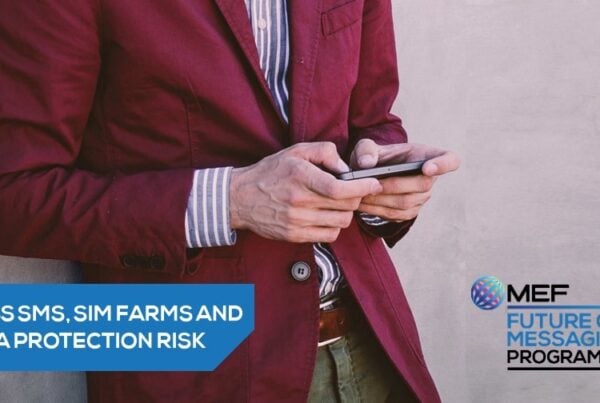 Fuelled by the growth in personal mobile connections, M2M, mobile apps and services, data traffic is expected to see an almost ten-fold increase by 2019.
Fuelled by the growth in personal mobile connections, M2M, mobile apps and services, data traffic is expected to see an almost ten-fold increase by 2019.
All of that connected activity means that businesses are swimming in mobile user data, a trend that is only set to continue as we move steadily toward a hyperconnected world of ubiquitous computing.
But what are the challenges that data-centric businesses face in the safe stewardship of personal data? Are companies aware of their responsibilities?
Ahead of MEF’s 6th annual Global Consumer Trust Summit in San Francisco we asked MEF members and the wider mobile community for their thoughts.
Julian Ranger
Founder & Chairman
digi.me
Julian Ranger, Founder & Chairman, digi.me
There is so much more businesses can do for consumers if we have more personal data to provide greater personalised services; not just more of the same, but a wider set of data across different categories whether social, financial, health, purchases, and much more.
Yet how do businesses get access to such Rich data in an era where individuals have ever greater privacy concerns, are restricting sharing where data is scraped and traded, and with increasing data protection rules such as the EU GDPR? The answer is surprisingly simple – ask the individual directly.
There is a shift in the marketplace where individuals will own and control their own data and companies such as digi.me are enabling that shift. Provide the right services, respect the individual by asking them directly for data clearly and explicitly, and you’ll get access to much richer data today – all compliant with data protection rules
Timo Laaksonen
Head of Operator Sales Americas
F-Secure
Timo Laaksonen, Head of Operator Sales Americas, F-Secure
Companies have an obligation to foster trust or else the threshold for convincing customers to share private data will understandably continue to rise. Our side of the bargain with users includes fair and transparent usage of their data, respect for privacy regulations, and, most of all, protection of personal data from breaches.
Mitigating risks starts with the generation of new data according to sensible and clear policies that apply the systematic application of best practices that compliance with privacy regulations. Storing that data requires strong cyber defences – including prediction and analysis of threats, protection, detection and remediation. As the process matures it needs to be continually refined by experts continually developing competitive competences. Usage must be justified by providing concrete value for customers whose personal data is used in a way that’s sensible and predictable.
Meticulous execution is essential, as any violation of consumer trust is enough to cast doubt on all processes.
The mobile industry’s opportunity is to be proactive toward customers, demonstrating that we value their privacy in a world that doesn’t. This must happen before trust is questioned or lost. By presenting education and options, the industry shows respect for personal data and the customer’s preferences. It also provides the chance to demonstrate the value created from the practical use of data.
With a focus on a constant respect for privacy, fair policies and a passion for transparency, users will recognize that the bargain they’ve made is as good for them as it is for us.
Jill Brittlebank
Senior Director
Zeta Interactive
Jill Brittlebank, Senior Director, Zeta Interactive
Smartphones are now our primary device for accessing the internet – we spend twice as long on our smartphones than on our laptops and PCs. For brands, this means more opportunities than ever to gain rich insight into consumers’ habits, preferences and lifestyles.
But privacy issues and a perceived lack of transparency about how data is used has left some consumers reluctant to divulge anything that doesn’t immediately enhance their engagement with a brand.
This is a particular challenge for mobile: as the ultimate “give to get” interface, customers need to get tangible results from every transaction without it feeling too intrusive or arduous.
To create this value exchange, brands must be able to show they are using this data appropriately and effectively. Understanding the psychology of their customers’ mobile use also gives marketers more opportunity to develop customer-centric functionality, such as swipe to like and short-term surveys.
For the consumer, this increased personalisation is the biggest pay off from sharing their data. Brands can only hope to achieve this by aggregating the many moments of mobile insight to deliver content that truly resonates with their individual customers.
Dan Wilson
VP Monetisation
Blis
Dan Wilson, VP Monetisation, Blis
Poorly drafted legislation and inconsistencies at a pan-regional level have made it difficult for businesses to fully unlock the benefits mobile data can bring. These challenges have been compounded by the perceived risks associated with the generation and storing of personal mobile data.
However, while recent, highly published hacks have undoubtedly caused ructions, much of the media hype has been scaremongering. While businesses can only act in accordance with the law, as it evolves, there will be new best practices around personal mobile data, which will play a vital role in reducing risks.
In addition, what consumer data is being used for and for what purposes should be discussed more widely to ensure the industry recognises consumer concerns. Despite these issues, the majority of people still appear to accept the trade of data for services, and in sharing their data are able to benefit from personalised, and valued, offerings.
Richard Lack
Director of Sales EMEA
Gigya
Richard Lack, Director of Sales EMEA at Gigya
With consumer data pouring in across mobile technologies, it can be excruciatingly difficult for brands to navigate the Big Data landscape.
Historically businesses purchased customer data without explicit permission from online users. Today, technology allows brands to gather information directly from their customers in a permission-based way. This is essential to modern marketing as 38 per cent of UK consumers would be more likely to share their information with businesses that remain transparent on how they plan to use their data.
To manage data effectively and gain customer loyalty, marketers must move beyond anonymous and siloed user data to create known, unified profiles that power one-to-one customer relationships. The answer is seeing people, not just numbers, all based on digital identity.
The benefit of collecting consumer data is clear: brands that use actionable, permission-based data to provide personalised, relevant offers and experiences will develop an in-depth understanding of their respective customer bases and be rewarded with significantly higher conversion rates and longer lasting customer relationships.
Jason Nathan
group MD for data
dunnhumby
Jason Nathan, group MD for data at dunnhumby
As the provision of services on mobile devices increases dramatically, the data they generate will increase in volume and – more importantly – intimacy.
For technology-led propositions like Uber, much of the challenge in effective stewardship of data springs from the difficulty in moving from a “start-up” culture to a mature business. By definition, these businesses will understand the technical controls well, but will be culturally averse to rigorous stewardship, as the cost of doing so would have constrained the initial growth curve. Meanwhile, for companies likes Starbucks, there will be legacy in terms of the controls and customer privacy statement in place, as well as the culture – which will likely be more risk-averse on handling sensitive data.
Ultimately, however, both need to be grounded in the principles of transparency, with a clear articulation of (and delivery of) a fair customer value exchange and a culture of treating data as an asset entrusted to them by their customers.
Jason du Preez
CEO
Privitar
Jason du Preez, CEO, Privitar
Companies need the embrace the irrefutable fact that the way they manage and process data will have a direct impact on brand and customer loyalty. We are now in a world where potential privacy harms may have devastating effects – loss of self-determination, loss of trust, discrimination and significant economic loss.
“While the opportunities presented by Big Data can be of enormous value to companies and their customers, the legal and ethical implications need to be understood. Organisations must be accountable for the way they process, store and use personal data. This, together with a well-understood trust framework in which customers are made aware of how their data is being used and shared and given clear and frequent choices around consent, will drive the realisation of these benefits within society.





